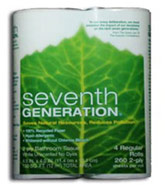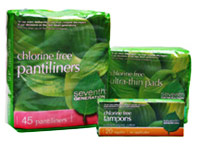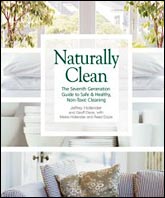
Jeffrey Hollender.
What work do you do?
I’m president of Seventh Generation, though lately I’ve been referring to myself as the Inspired Protagonist, providing the vision and inspiration to carry the company forward.
How does your work relate to the environment?

Photos: Seventh Generation.
Our company provides nontoxic cleaners, recycled paper towels and tissues, and other alternatives to unhealthy conventional household products. But those products are really just the vehicle for promoting an idea called the Precautionary Principle, which says that when it comes to things that could affect the environment, we should take a good look before we leap and err on the side of caution. If there’s any doubt about an activity, then that activity should be set aside until its safety is proved. It’s the opposite of “shoot first and ask questions later,” which is the philosophy that’s gotten us into all this trouble.
What are you working on at the moment? Any major projects?
Our Change It program is partnering with Greenpeace to send 100 students to Washington, D.C., for a week. It’s summer camp for tomorrow’s activists. These students will head home ready to lead their communities to a better place. We’re seeding the country with people who can change it. That’s a very powerful idea to me.

We’ve also just created a website called Tampontification that encourages women to share their thoughts about menstruation as a way to get them thinking about safer choices. As a husband and the father of two daughters, this is really a personal mission for me. We’re also using the site to encourage volunteerism, rally donations to organizations helping homeless people, and connect people in need to those who can help.
And I’m really energized about our new blog — The Inspired Protagonist — creating a community for exchanging ideas and promoting social justice and environmental ethics. I like things that connect the power of one individual to the power of many others to create an energy that’s greater than the sum of its parts. I guess you could say that my work involves facilitating those connections.
How do you get to work?
I drive an Audi convertible, but its days are numbered. I’m working on retrofitting an old car to use biodiesel. It’s turning out to be an involved process because you have to start with a diesel engine, and you can’t buy diesel passenger cars in Vermont so I have to go out of state. But it’s really interesting.
winding road led you to your current position?
In my 20s, I founded an adult-education business in New York City. It was surprisingly successful, but not very meaningful. One day I found myself on national television defending certain shallow ideals that were the subject of classes we offered (see “worst professional moment,” below!). I realized that I didn’t want to teach people how to harness their worst instincts for personal gain. I wanted to make the world a better place. Since then, I’ve been trying to figure out ways to do that. Seventh Generation is the current culmination of that process.
Where were you born? Where do you live now?
I was born in New York City. Today my family lives in Charlotte, Vt., a small town outside Burlington. Vermont hasn’t lost its sense of scale like other places. Everything is still manageable. Life moves more slowly. There’s no constant overload of empty distractions, which leaves much more time for the things that matter.
What has been the worst moment in your professional life to date?
Being on the Phil Donahue Show and defending a class I’d created called “How to Marry Money.” I realized at that moment that I had turned into the kind of person I most detested, which is someone who can rationalize anything in the pursuit of money. When I walked off the set, I was literally sick. I decided right there to sell the business.
What’s been the best?
In 2004, the U.S. Chamber of Commerce — perhaps America’s most conservative business organization — gave Seventh Generation its Corporate Stewardship Small Business Award. I found myself at a banquet table in D.C. with Don Evans, the secretary of commerce, and the CEOs of some pretty big and, in some cases, pretty bad companies. Even though my heart was pounding itself to pieces, I had the bully pulpit that evening and used it to tell everyone there what was wrong with the way they were doing business.
What environmental offense has infuriated you the most?
The total lack of understanding of externalized costs. For example, when a company pollutes the air, it might be saving money on clean-air technologies, but those costs are just passed on to someone else. Governments have to clean up the mess. Our health-care system has to treat asthmatics. These are real costs. They’re just taken off society’s bottom line rather than the company’s.
Who is your environmental hero?
Right now it’s Buckminster Fuller.
What’s your environmental vice?
I’m not as concerned about the environment as I am about social-justice issues. But you can’t divorce the environment from social justice. So I guess if I have an environmental vice, it’s that our company has been too focused on the environment. The people most at risk from the conventional products our brand is meant to replace can’t afford to buy our stuff. That keeps me up at night, and as a company we’re working on resolving this.
How do you spend your free time?
Surfing.
Read any good books lately?
Peter Senge’s new book Presence is wonderful.
What’s your favorite meal?
Seafood. Any kind, prepared any way.
Which stereotype about environmentalists most fits you?
None! I don’t consider myself an environmentalist. An environmentalist is someone who deconstructs the world and figures out the one problem they’re concerned about without seeing that everything is related. You need to think systemically in order to fix all the parts of the world that are broken. Environmentalism can’t do that because its focus is too narrow.
What’s your favorite place or ecosystem?
The ocean.
If you could institute by fiat one environmental reform, what would it be?
Every product or service would reflect its full social and environmental cost. Organic foods would cost half as much as conventional foods and a Hummer would set you back $2 million.
Who was your favorite musical artist when you were 18? How about now?
Then, Joni Mitchell. Now, Death Cab for Cutie.
What’s your favorite TV show? Movie?
Which actor would play you in the story of your life?
I drew a blank, so I put it to an office vote. It was a draw between Dustin Hoffman and Mel Gibson. I’ll let you be the judge …
If you could have every InterActivist reader do one thing, what would it be?

Naturally Clean: The Seventh Generation
Guide to Safe & Healthy, Non-Toxic
Cleaning.
Realize that you really do have the ability to change the world. It can be as simple as making small changes at home.
Pick up a copy of my new book Naturally Clean, which provides room-by-room tips for eliminating toxic chemicals from your home — protecting your health and the environment’s. All of the royalties from book sales are going to the Children’s Health Environmental Coalition, a nonprofit working to educate parents and empower the public to protect children from the toxic threats in homes, schools, and communities.


